Rapes increase by 29% as overall crime falls in England and Wales
- Published

The number of rapes reported to and recorded by police in England and Wales is at its highest ever level, official figures have shown.
There were 22,116 recorded rapes in the year to June, a rise of 29% on the year before, police figures released by the Office for National Statistics show.
Victims are "more willing" to report rape, Crime Minister Norman Baker said.
Separate statistics from the Crime Survey for England and Wales showed overall crime fell by 16% to 7.1m.
The overall figure covers crimes against households and adults in England and Wales, and this type of crime is at its lowest level since the survey began in 1981.
'Taking action'
John Flatley, head of crime statistics at the ONS, told the BBC the increase in recorded rapes was driven by two main factors.
He said: "We have seen over the last few years a notable rise in victims coming forward to report historical offences.
"But this recent set of figures shows quite a change in that pattern, with 73% of the rise due to current offences.
"So victims are coming forward now to report recent occurrences rather than historical ones and it's certainly the case the police are taking action to improve their recording and handling of rape investigations."

The ONS figures also showed a 48% increase in knife-point rapes, from 199 to 294.

Analysis

Danny Shaw, BBC home affairs correspondent
The increase in police recorded rape offences follows a trend that began after the Jimmy Savile affair in 2012, when more sexual abuse victims felt empowered to report what had happened to them.
It also reflects changes in police procedures after some forces were criticised for wrongly chalking off rape allegations - a practice known as "no criming".
But it is unclear whether the increase is also partly due to a real rise in rape and no clues are offered by the Crime Survey, which doesn't ask people if they have been victims of sexual offences.
However, statisticians were clear that a 48% rise in knife-point rapes is not due to different recording methods but is likely to be "genuine".
Even though the number of such offences is relatively small, that is a real concern - and something that is not currently well understood.

Crime Prevention Minister Norman Baker said alleged rape victims were now more willing to come forward than in the past.
He added: "We've improved the police recording of these terrible crimes and consequently we're now seeing an official increase."
Shadow home secretary Yvette Cooper said: "These figures show a shocking failure to help rape victims and bring dangerous criminals to justice."
'Tip of iceberg'
Liz McKean, co-director of the End Violence Against Women Coalition said she would consider the figures positive if the increase in rape reports was due to alleged victims feeling more able to come forward.
She said: "Women's support services line Rape Crisis have certainly been seeing an even larger increase in calls to their help lines from women abused in the past and now seeking support."
A spokeswoman for Rape Crisis, which campaigns to eliminate sexual violence, said the the figures were "just the tip of the iceberg" and sexual violence remains "hugely under-reported".
Chief Constable Jeff Farrar, national lead on crime statistics for the Association of Chief Police Officers, said it was "reassuring" to see an increase in the reporting of sexual offences.
"This shows that victims of abuse have greater confidence that if they report to the police they will be listened to, taken seriously and their report will be investigated fully, regardless of when the offence took place," he said.

Overall, police-recorded crime was stable, though fraud and shoplifting increased.
Hate crime showed an increase of 5% to 44,480 incidents in the year-long period, up from 42,236 the previous year.
Race hate crimes were also up 4% to 37,484 incidents and religious hate crimes were up 45% to 2,273 offences.
'Right direction'
BBC home affairs correspondent Danny Shaw said statisticians believed this was driven by higher levels of hate crime in the wake of the murder of soldier Lee Rigby in May last year.
On the overall crime figure, Mr Baker said the government was "cracking crime".
He said: "The public at large can have confidence that this is going in the right direction. I think people are less worried about crime than they were."
Mr Farrar said the overall figures "again demonstrate" the police service's commitment to reducing crime and improving the way forces record it.
Thursday's figures do not cover Scotland and Northern Ireland.
The overall crime rate rose by 1.7% in Northern Ireland in the 12 months to the end of August.
In March, the Scottish government said crime had fallen by 22% in four years.
- Published31 January 2014

- Published2 December 2013

- Published19 November 2013
